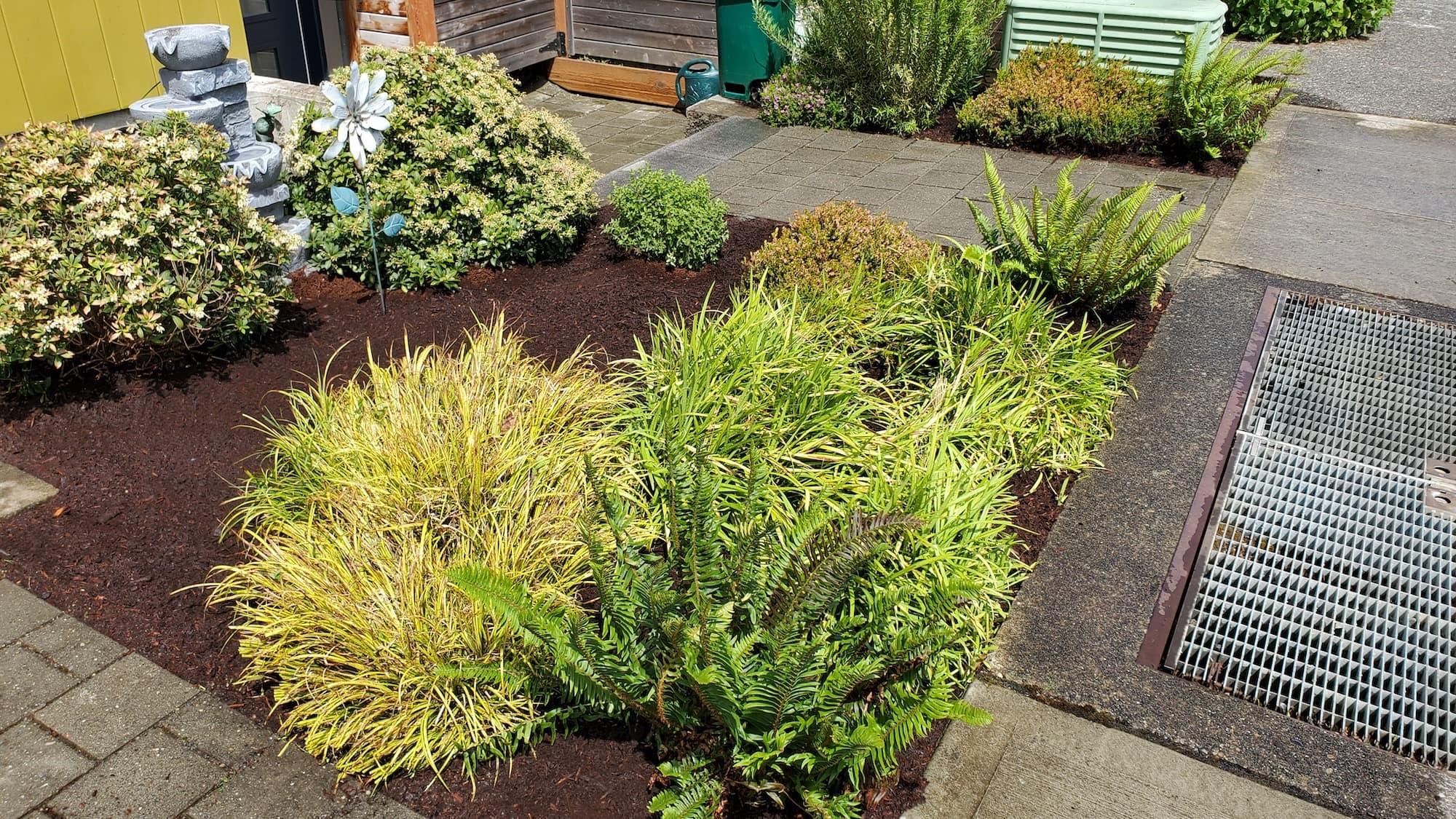West Seattle rebuild eroded slope contractor
Homeowner’s Issue
West Seattle sits on compacted glacial soils with pockets of sandy loam near the bluff and heavier, clay‑like fill in older neighborhoods like Admiral and parts of Arbor Heights. Winters are wet and mild, with heavy seasonal rain and occasional winter storms that push water down slopes and strip mulch and topsoil. Many yards here have short, steep grades or terraces above Beach Drive and Lincoln Park where runoff concentrates, exposing roots and creating rills. Shaded ravines near Schmitz Preserve and tree canopy cover encourage moss and slow drainage, while sunnier southwest‑facing slopes toward Alki dry out quickly in summer and suffer drought stress.
Homeowners see soil washouts after heavy rains, slumping beds, or undercut steps and paths — problems that worsen with compacted soil, clogged gutters, and improper downspout discharge. HOA and curb‑appeal expectations in the Junction and custom lots in Fauntleroy mean an ugly eroded bank can become a liability, not just eyesore. Our approach respects Seattle’s watering rules and uses water‑wise, native plantings, erosion blankets, and passive drainage to stabilize ground without synthetic herbicides. In short: predictable, sustainable fixes that suit our microclimates and steep, wet West Seattle slopes.
Our Quality Service
We assess the slope, sketch a plan, and use hand crews plus small equipment to limit disturbance. Typical tools and methods: compost and soil amendments, erosion control blankets, native deep‑rooted plants, wattles/silt socks, and French drains or dry swales to redirect flow. For steeper sites, we install timber or stacked stone terraces and natural retaining features that match neighborhood character.
Expect a realistic timeline: small repairs in 1–2 days, mid‑size rebuilds 3–5 days, larger terraces or drainage installs up to a week depending on permits and access. We work during normal hours, haul debris to green waste or permitted transfer stations, and use sustainable materials only — no herbicides.
Benefits: safer slopes, improved curb appeal, reduced long‑term maintenance, and fewer surprise failures during West Seattle’s rainy season.
What’s Included
- Site assessment and erosion mapping.
- Soil prep: decompaction, organic amendments, and grading.
- Drainage fixes: French drain, swale, or redirected downspouts.
- Erosion control: certified erosion blankets or jute mesh and wattles.
- Planting: native groundcovers, grasses, and deep‑rooted shrubs.
- Clean haul‑away or green‑bin disposal and final tidy.
Options / Upgrades:
- Mulch + landscape fabric (spot application where appropriate).
- Organic weed control: hand‑weeding, solarization, and mulching.
- Native pollinator mix or curb‑appeal plant packages.
- Timber or stone terracing and step construction.
- Irrigation: drip lines for new plantings (installed to city watering rules).
Before & After / Expectations
We’ll leave sites tidy but expect some temporary bare soil until plantings establish — usually 3–12 months for full root holding. Work is noisy when grading or moving rock; smaller manual cures are quieter. Access matters: tight alleys or stairs may add time or require additional labor.
Aftercare tips for West Seattle:
- Water new plantings in the morning during dry months; follow city watering guidelines.
- Watch for spring weed flushes in shaded ravines; pull before seeding.
- Keep gutters and downspout extenders clear — most slope failures start with concentrated roof runoff.
- Monitor ivy and blackberry on slopes; remove by hand and replant with natives to outcompete invasives.
FAQs (3–5)
Q: How long before new plantings stabilize the slope?
A: Expect 3–12 months for root systems to establish; soil stabilization products provide immediate support.Q: Will you use herbicides to clear invasives?
A: No. We use hand removal, solarization, and organic methods only — no synthetic herbicides.Q: Do you handle drainage permits or city connections?
A: We advise on permit needs and can coordinate with you or your engineer; simple French drains usually don’t need city permits.Q: What about hauling debris?
A: We offer green‑bin disposal or haul‑away to transfer stations; we’ll itemize disposal in the estimate.
Call to Action
If your West Seattle bank is slipping or you want a long‑term, low‑maintenance repair, book a free estimate. We schedule work quickly in off‑season windows to reduce wet‑weather risk and protect plantings. Local experience means we know Lincoln Park bluffs, Alki exposures, and the shady ravines—so you get practical, durable fixes.
Email neatandtidyseattle@gmail.com or call 206-538-9344 for a no‑nonsense quote and timeline from a local crew you can trust.










